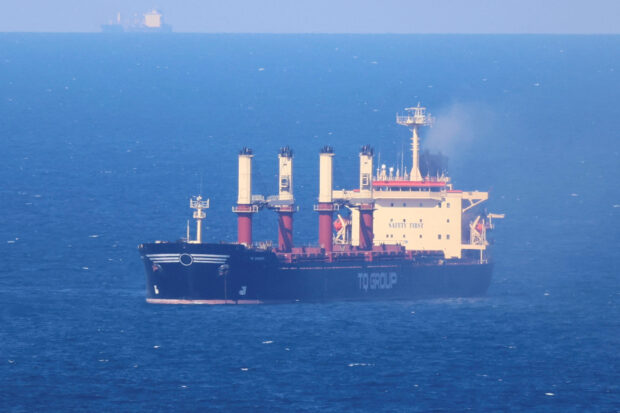Black Sea grain deal expires after Russia quits

Turkish-flagged bulker TQ Samsun, carrying grain under UN’s Black Sea Grain Initiative, is pictured in the Black Sea, north of Bosphorus Strait, off Istanbul, Turkey July 17, 2023. REUTERS/Yoruk Isik
UNITED NATIONS/MOSCOW -A deal allowing the safe Black Sea export of Ukraine’s grain for the past year expired on Monday after Russia quit and warned it could not guarantee the safety of ships in a move the United Nations said would “strike a blow to people in need everywhere.”
Moscow suggested that if demands to improve exports of its own grain and fertilizer were met it would consider resurrecting the Black Sea agreement. However, U.N. Secretary-General Antonio Guterres said that a U.N. pact that aimed to help facilitate Russia’s shipments over the past year was also terminated.
“Only upon receipt of concrete results, and not promises and assurances, will Russia be ready to consider restoring the deal,” said Russia’s foreign ministry.
READ: Russia will return to grain deal when demands are met- Kremlin spokesman
Russia told the U.N. shipping agency – the International Maritime Organization (IMO) – that its “guarantees for the safety of navigation” had been revoked and that “proactive necessary actions and response measures to neutralize threats posed by the Kiev regime in the area will be taken.”
Insurers on Monday were reviewing whether to freeze cover for any ships willing to sail to Ukraine.
U.S. wheat and corn futures slumped after earlier hitting two-week highs on Russia’s announcement. Analysts said there are still expectations the grain deal may be renewed and the markets were well aware of the risk for it to expire.
The Black Sea deal was brokered by the U.N. and Turkey in July last year to combat a global food crisis worsened by Russia’s February 2022 invasion of Ukraine. Ukraine and Russia are among the world’s top grain exporters.
Russia has complained that under the deal not enough grain has reached poor countries. But the U.N. argued the arrangement has benefited those states by helping lower food prices more than 20 percent globally.
READ: Moscow halts grain deal in what UN says is a blow to people in need everywhere
“Hundreds of millions of people face hunger and consumers are confronting a global cost-of-living crisis. They will pay the price,” Guterres said of Russia’s decision, adding that the U.N. would continue trying to get unimpeded access to global markets for food and fertilizers from Ukraine and Russia.
Ukrainian President Volodymyr Zelenskiy said he spoke with Guterres on Monday about trying to renew Black Sea shipments.
Turkish President Tayyip Erdogan said he believed Putin wants the deal to continue and would discuss with him it when they meet in person in August.
U.S. Secretary of State Antony Blinken accused Russia of a “continued weaponization of food” that harms millions of vulnerable people around the world.
‘Blackmail’
At a U.N. Security Council meeting on Ukraine on Monday, most countries urged Russia to resume the deal.
Russia’s Deputy U.N. Ambassador Dmitry Polyanskiy told the council there had been no progress on improving Russia’s exports and accused Ukraine of using “the cover of the open maritime corridor to wage provocations and attacks against Russian civilians and military objects.” He did not provide evidence.
“Russia is blackmailing the world,” Ukraine’s Foreign Minister Dmytro Kuleba told the council. “This blackmail affects the lives of millions of Ukrainians and tens of millions more around the world, primarily in Africa and Asia, who face the threat of rising food prices and hunger.”
Nearly 33 million metric tons of corn, wheat and other grains have been exported by Ukraine under the arrangement. The last ship left Ukraine under the deal on Sunday.
To convince Russia to agree to the Black Sea deal, a three-year memorandum of understanding was struck in July 2022 under which U.N. officials agreed to help Russia get its food and fertilizer exports to foreign markets.
While Russian exports of food and fertilizer are not subject to Western sanctions imposed after Russia’s invasion, Moscow has said restrictions on payments, logistics and insurance have amounted to a barrier to shipments.
Russia’s main demands were the resumption of its ammonia exports through a pipeline to the Ukrainian port of Odesa and the reconnection of its state agricultural bank Rosselkhozbank to the SWIFT international payments system. It was cut off by the European Union in June last year after the invasion.
Guterres said on Monday that the U.N. had managed to create a “bespoke payments mechanism” for the Russian Agricultural Bank through U.S. bank JPMorgan Chase & Co and “recently brokered a concrete proposal” with the European Commission to enable a Rosselkhozbank subsidiary to regain access to SWIFT.
But he signaled that all those efforts would end because Russia’s withdrawal from the Black Sea deal also terminated its pact with the U.N. on its own exports, under which Moscow had committed to “facilitate the unimpeded export of food, sunflower oil, and fertilizers from Ukrainian-controlled Black Sea Ports.